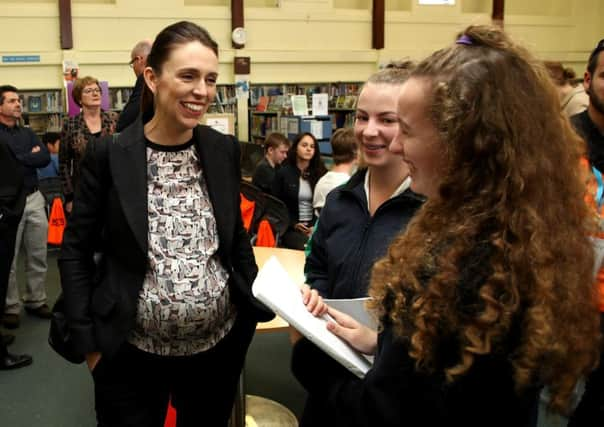Kirsty Gunn: Beware talk about the success of '˜small countries'


Countries like New Zealand, I’ve been reading about, that are being presented to us as appealingly socially holistic and innovative and brave, untrammelled as they are by the legacies and exigencies of an old world order.
Well, I’m not so sure. I was born in New Zealand, and when I was last there, not that long ago, actually, all everybody was talking about in liberal, cultural circles was the shocking widening gap between the developing super rich and the rest of the population. The way it didn’t used to be like that. There was much reference to the way property across the two islands, in rural areas and the cities, was being gobbled up by mostly foreign investment, by anyone who had the large wads of cash no one else could come near to possessing, leaving young people bumped out of the property market and a land that had always prided itself on having – much like Scotland – a wonderful open-access attitude to the wild and open places suddenly becoming fenced off and guarded by private security firms.
Advertisement
Hide AdThe poet and land activist Brian Turner, a great fisherman and walker and outdoorsman, told me a story – the horror of it still fresh in his eyes – of how he was making his annual pilgrimage to a salmon river he’s fished in since he was a boy, his rod and his tent on his back, walking through central Otago, when he was stopped by a military-looking individual on horseback with a rifle who demanded that he turn around and leave, that this was private property and he was trespassing.
I was thinking about that last week when I saw Fiona Kidman, one of New Zealand’s best-known and highly regarded novelists, who was in London for the UK launch of her latest work of fiction, “All Day at the Movies”, a story spanning 50 years, about growing up and growing old, and what it is to be a woman enmeshed in domestic life and politics, coming into a quiet but certain kind of feminist empowerment. Fiona and I had supper together and were talking about New Zealand, mutual friends and the world of books and arts, and conversation turned towards politics and the great excitement around the election of Jacinda Arden, the new Prime Minister there.
“She’s like a fresh breeze,” Fiona reiterated the following night at Belgravia Books in Victoria, where she was launching the novel and talking about her love of New Zealand’s small towns and rural communities. “We are all of us in New Zealand just hoping she can help get us out of the terrible mess we’re in.”
Sound familiar? Terrible messes are what we’re all in, for one reason or another, following years of unchecked capitalism and market deregulation, of cuts to public services and a downgrading of things that matter like education and hospitals and replacing them with concepts of privatisation and commodification – having everything run to “outcomes” and “profit margins” at the expense of individual human need and betterment. When I was in New Zealand, I was shocked by the amount of homelessness, and the very clear indication that poverty was also a race issue. In the main it was those of Maori and Pacific island descent I saw sleeping rough and walking around barefoot in all kinds of weather. Like something out of Dickens, only far, far away from London – and in one of those “small countries” Nicola Sturgeon seeks to emulate.
Fiona is a Dame and so, one might think, rather grand, but like the other Dame I know, the fabulous Sue Black – Scotland’s internationally renown anatomist and forensic anthropologist who pioneered new ways of disaster victim identification and of studying the body and human remains that has transfigured police practice and who, alas, has been lost to England – she’s not grand at all. Only great fun, and clever, and lovely.
When I saw Fiona we also talked about our mutual friend Vincent O’Sullivan, New Zealand’s recent Poet Laureate and the internationally regarded writer and scholar, and his wonderful new novel, “All This By Chance”, that stretches from London to post-war New Zealand and takes in Jewish identity, family and desire ... and about the way all good stories that are international in texture and attitude bring to local literature a depth and seriousness you can’t attain if you’re just writing about yourself all the time: your own country, your own way of doing things. Only another kind of “small country” thinking, that.
Advertisement
Hide AdLiterary scenes are cliquey enough anywhere you look – but in cultural life we must strive to resist what I call “we” thinking. Some of the characters in O’Sullivan’s novel are unappealing, and yet the novelist’s art is to have us see into them, to probe at those aspects we don’t like in order to understand them better and in the end come to feel empathy and connection. It’s a transformation that art can help us with – from what “we” find difficult, to what “I can come to understand – and O’Sullivan’s novel, in speaking of the world beyond where the writer lives, shows the way we might be able to imagine fresh perspectives for our countries without falling back on false tropes and the idealised versions of “small” independent nations, like those put about by the Scottish Government.
The New Zealand of my childhood, of open spaces and pretty much everyone on a level, with great free education and opportunities and access to affordable housing and all the pleasures of a rural landscape available to all, is fretted with wind turbines now and criss-crossed with private roads and barbed wire that say Keep Out. If that’s the price for independence, then what a cost.
